Financial Accounting Part 2
VerifiedAdded on 2020/12/24
|9
|1351
|328
Report
AI Summary
This report explores key concepts in financial accounting, including bank reconciliation, suspense accounts, and rectification entries. It examines the significance of bank statements for businesses, comparing different banking services and their impact on financial records. The report also provides a practical example of reconciling bank statements and demonstrates how to handle suspense accounts with journal entries.
Contribute Materials
Your contribution can guide someone’s learning journey. Share your
documents today.
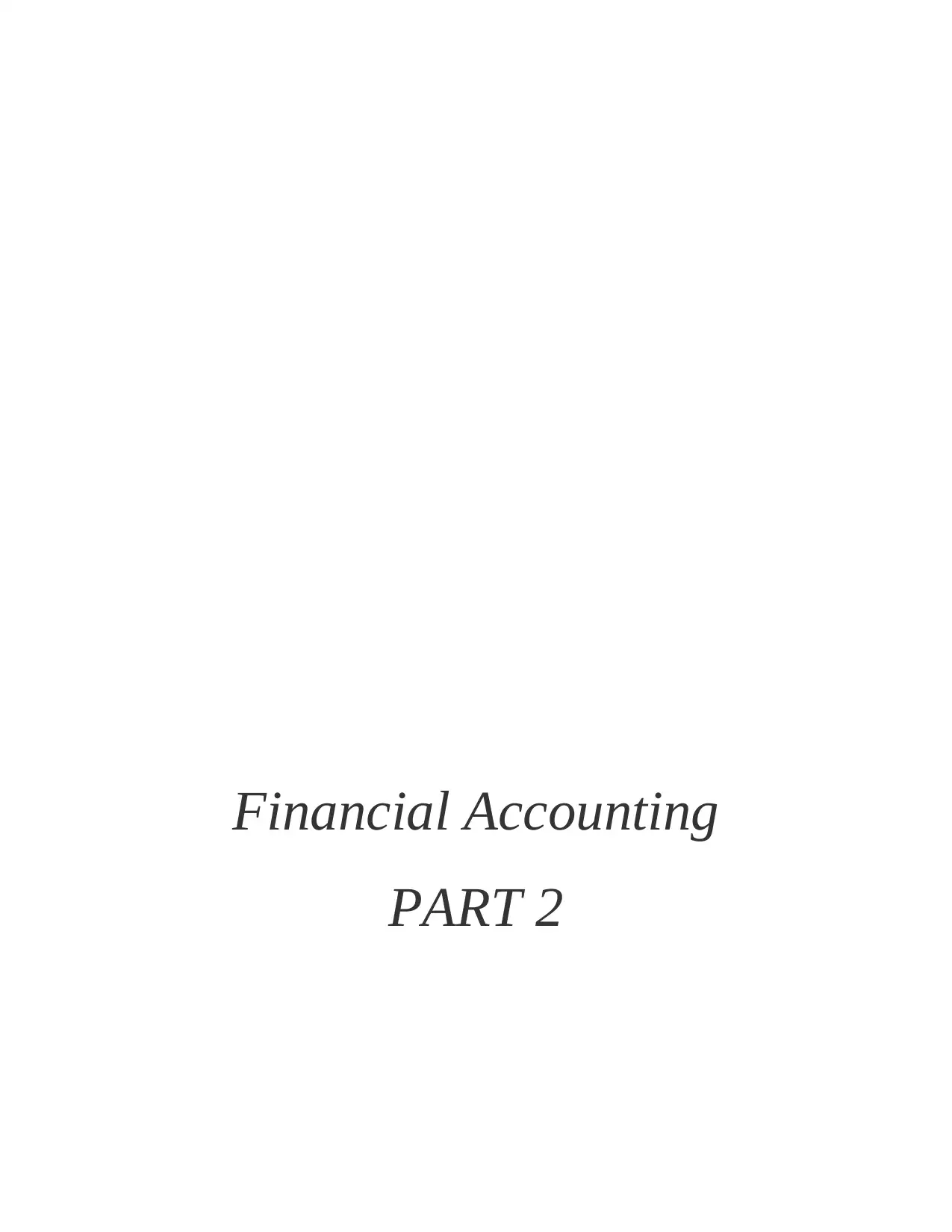
Financial Accounting
PART 2
PART 2
Secure Best Marks with AI Grader
Need help grading? Try our AI Grader for instant feedback on your assignments.

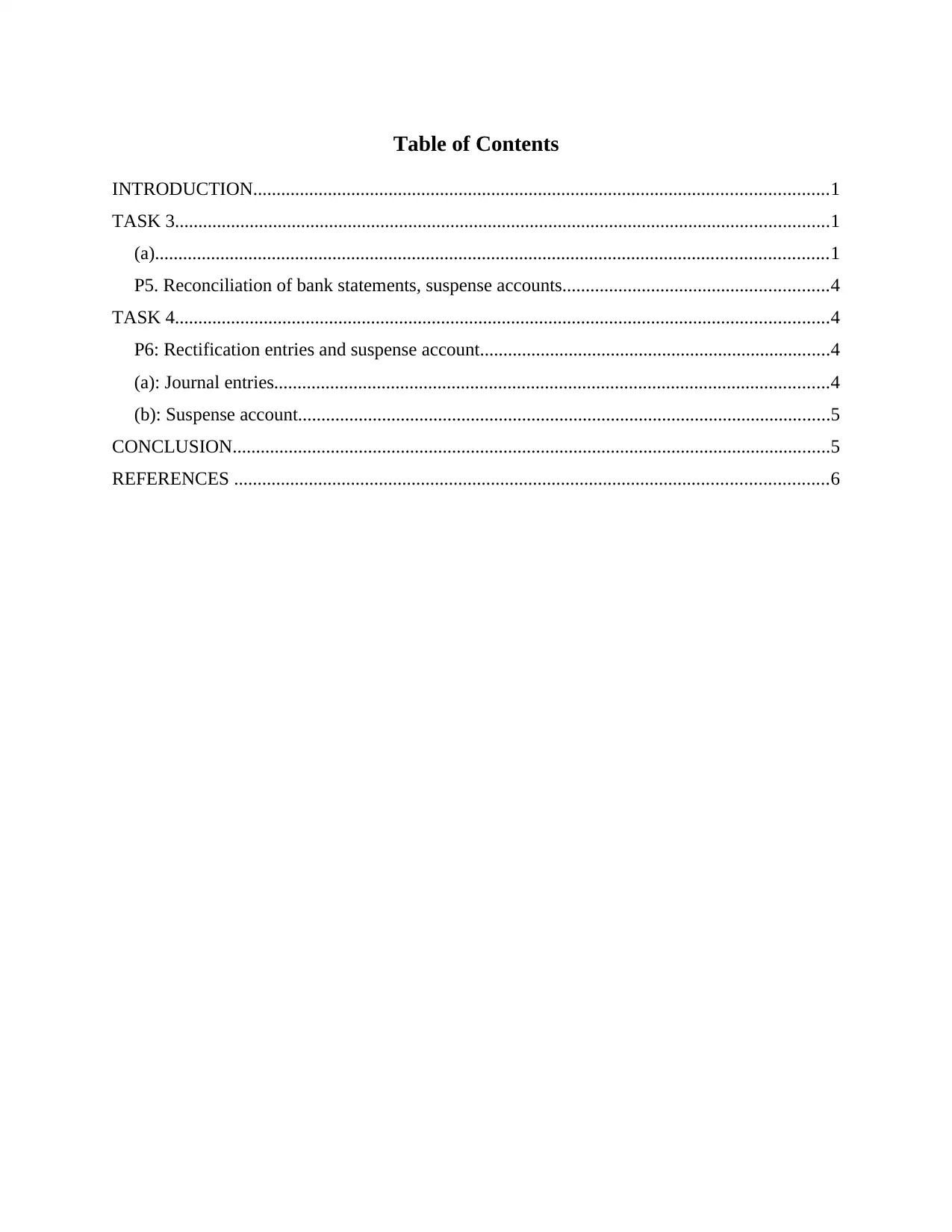
Table of Contents
INTRODUCTION...........................................................................................................................1
TASK 3............................................................................................................................................1
(a)................................................................................................................................................1
P5. Reconciliation of bank statements, suspense accounts.........................................................4
TASK 4............................................................................................................................................4
P6: Rectification entries and suspense account...........................................................................4
(a): Journal entries.......................................................................................................................4
(b): Suspense account..................................................................................................................5
CONCLUSION................................................................................................................................5
REFERENCES ...............................................................................................................................6
INTRODUCTION...........................................................................................................................1
TASK 3............................................................................................................................................1
(a)................................................................................................................................................1
P5. Reconciliation of bank statements, suspense accounts.........................................................4
TASK 4............................................................................................................................................4
P6: Rectification entries and suspense account...........................................................................4
(a): Journal entries.......................................................................................................................4
(b): Suspense account..................................................................................................................5
CONCLUSION................................................................................................................................5
REFERENCES ...............................................................................................................................6
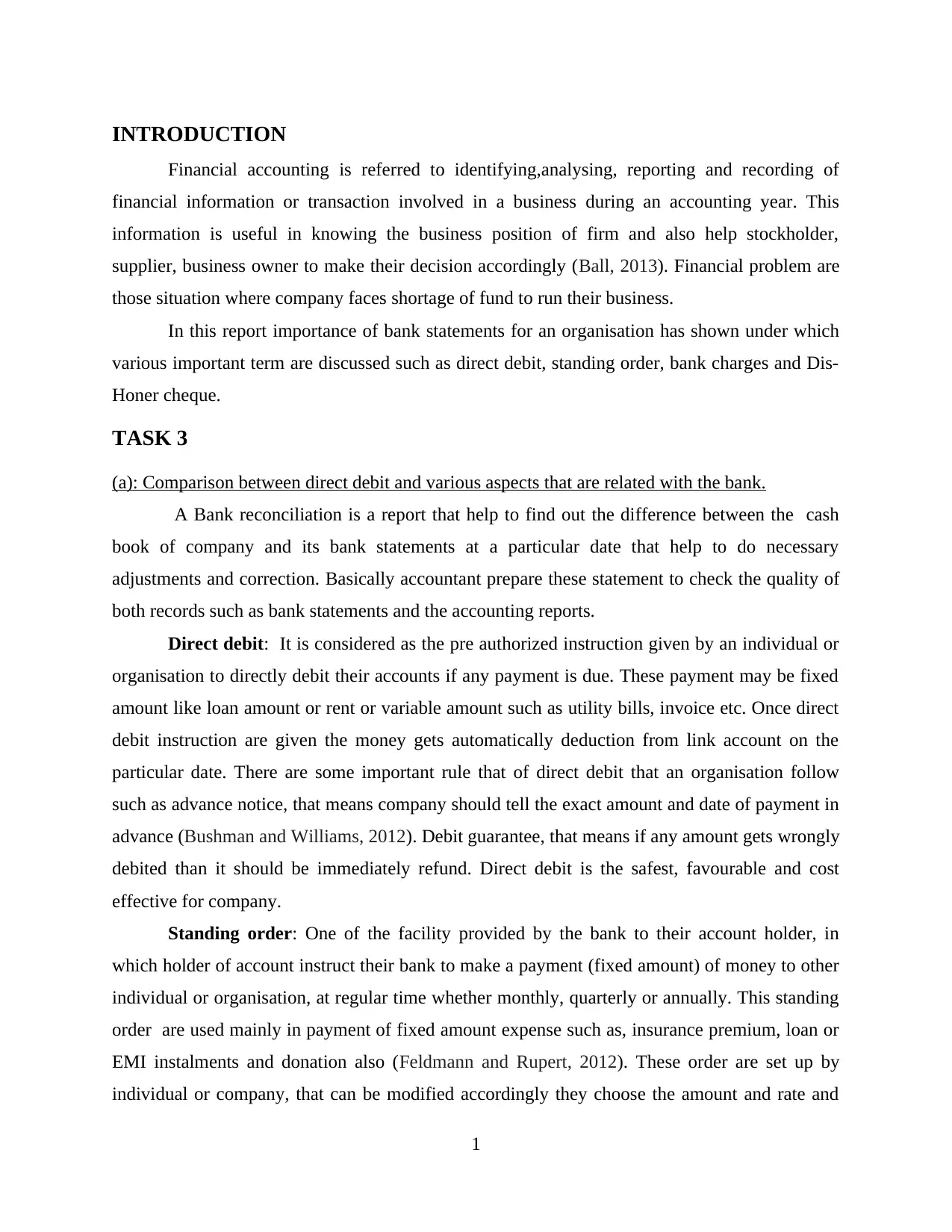
INTRODUCTION
Financial accounting is referred to identifying,analysing, reporting and recording of
financial information or transaction involved in a business during an accounting year. This
information is useful in knowing the business position of firm and also help stockholder,
supplier, business owner to make their decision accordingly (Ball, 2013). Financial problem are
those situation where company faces shortage of fund to run their business.
In this report importance of bank statements for an organisation has shown under which
various important term are discussed such as direct debit, standing order, bank charges and Dis-
Honer cheque.
TASK 3
(a): Comparison between direct debit and various aspects that are related with the bank.
A Bank reconciliation is a report that help to find out the difference between the cash
book of company and its bank statements at a particular date that help to do necessary
adjustments and correction. Basically accountant prepare these statement to check the quality of
both records such as bank statements and the accounting reports.
Direct debit: It is considered as the pre authorized instruction given by an individual or
organisation to directly debit their accounts if any payment is due. These payment may be fixed
amount like loan amount or rent or variable amount such as utility bills, invoice etc. Once direct
debit instruction are given the money gets automatically deduction from link account on the
particular date. There are some important rule that of direct debit that an organisation follow
such as advance notice, that means company should tell the exact amount and date of payment in
advance (Bushman and Williams, 2012). Debit guarantee, that means if any amount gets wrongly
debited than it should be immediately refund. Direct debit is the safest, favourable and cost
effective for company.
Standing order: One of the facility provided by the bank to their account holder, in
which holder of account instruct their bank to make a payment (fixed amount) of money to other
individual or organisation, at regular time whether monthly, quarterly or annually. This standing
order are used mainly in payment of fixed amount expense such as, insurance premium, loan or
EMI instalments and donation also (Feldmann and Rupert, 2012). These order are set up by
individual or company, that can be modified accordingly they choose the amount and rate and
1
Financial accounting is referred to identifying,analysing, reporting and recording of
financial information or transaction involved in a business during an accounting year. This
information is useful in knowing the business position of firm and also help stockholder,
supplier, business owner to make their decision accordingly (Ball, 2013). Financial problem are
those situation where company faces shortage of fund to run their business.
In this report importance of bank statements for an organisation has shown under which
various important term are discussed such as direct debit, standing order, bank charges and Dis-
Honer cheque.
TASK 3
(a): Comparison between direct debit and various aspects that are related with the bank.
A Bank reconciliation is a report that help to find out the difference between the cash
book of company and its bank statements at a particular date that help to do necessary
adjustments and correction. Basically accountant prepare these statement to check the quality of
both records such as bank statements and the accounting reports.
Direct debit: It is considered as the pre authorized instruction given by an individual or
organisation to directly debit their accounts if any payment is due. These payment may be fixed
amount like loan amount or rent or variable amount such as utility bills, invoice etc. Once direct
debit instruction are given the money gets automatically deduction from link account on the
particular date. There are some important rule that of direct debit that an organisation follow
such as advance notice, that means company should tell the exact amount and date of payment in
advance (Bushman and Williams, 2012). Debit guarantee, that means if any amount gets wrongly
debited than it should be immediately refund. Direct debit is the safest, favourable and cost
effective for company.
Standing order: One of the facility provided by the bank to their account holder, in
which holder of account instruct their bank to make a payment (fixed amount) of money to other
individual or organisation, at regular time whether monthly, quarterly or annually. This standing
order are used mainly in payment of fixed amount expense such as, insurance premium, loan or
EMI instalments and donation also (Feldmann and Rupert, 2012). These order are set up by
individual or company, that can be modified accordingly they choose the amount and rate and
1
Secure Best Marks with AI Grader
Need help grading? Try our AI Grader for instant feedback on your assignments.
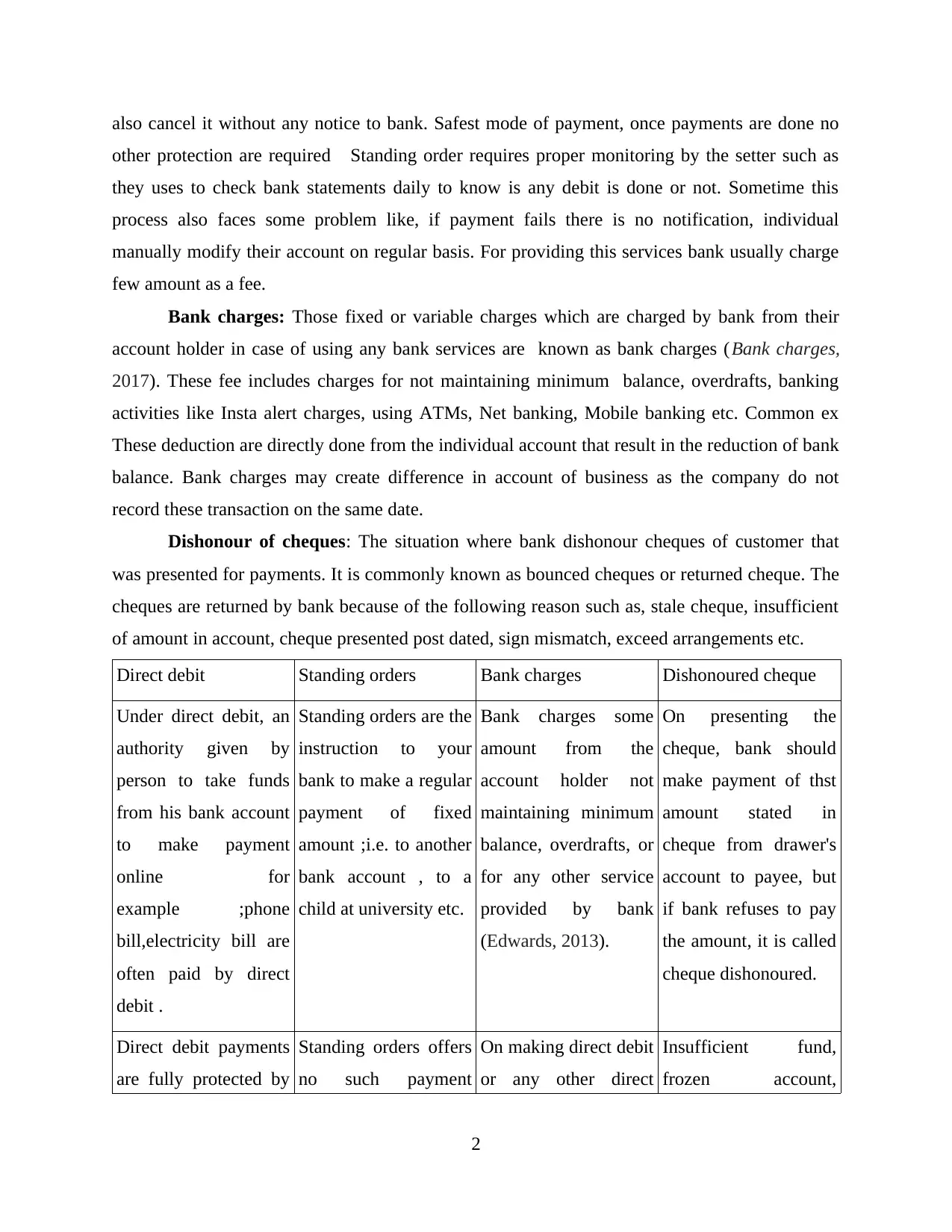
also cancel it without any notice to bank. Safest mode of payment, once payments are done no
other protection are required Standing order requires proper monitoring by the setter such as
they uses to check bank statements daily to know is any debit is done or not. Sometime this
process also faces some problem like, if payment fails there is no notification, individual
manually modify their account on regular basis. For providing this services bank usually charge
few amount as a fee.
Bank charges: Those fixed or variable charges which are charged by bank from their
account holder in case of using any bank services are known as bank charges (Bank charges,
2017). These fee includes charges for not maintaining minimum balance, overdrafts, banking
activities like Insta alert charges, using ATMs, Net banking, Mobile banking etc. Common ex
These deduction are directly done from the individual account that result in the reduction of bank
balance. Bank charges may create difference in account of business as the company do not
record these transaction on the same date.
Dishonour of cheques: The situation where bank dishonour cheques of customer that
was presented for payments. It is commonly known as bounced cheques or returned cheque. The
cheques are returned by bank because of the following reason such as, stale cheque, insufficient
of amount in account, cheque presented post dated, sign mismatch, exceed arrangements etc.
Direct debit Standing orders Bank charges Dishonoured cheque
Under direct debit, an
authority given by
person to take funds
from his bank account
to make payment
online for
example ;phone
bill,electricity bill are
often paid by direct
debit .
Standing orders are the
instruction to your
bank to make a regular
payment of fixed
amount ;i.e. to another
bank account , to a
child at university etc.
Bank charges some
amount from the
account holder not
maintaining minimum
balance, overdrafts, or
for any other service
provided by bank
(Edwards, 2013).
On presenting the
cheque, bank should
make payment of thst
amount stated in
cheque from drawer's
account to payee, but
if bank refuses to pay
the amount, it is called
cheque dishonoured.
Direct debit payments
are fully protected by
Standing orders offers
no such payment
On making direct debit
or any other direct
Insufficient fund,
frozen account,
2
other protection are required Standing order requires proper monitoring by the setter such as
they uses to check bank statements daily to know is any debit is done or not. Sometime this
process also faces some problem like, if payment fails there is no notification, individual
manually modify their account on regular basis. For providing this services bank usually charge
few amount as a fee.
Bank charges: Those fixed or variable charges which are charged by bank from their
account holder in case of using any bank services are known as bank charges (Bank charges,
2017). These fee includes charges for not maintaining minimum balance, overdrafts, banking
activities like Insta alert charges, using ATMs, Net banking, Mobile banking etc. Common ex
These deduction are directly done from the individual account that result in the reduction of bank
balance. Bank charges may create difference in account of business as the company do not
record these transaction on the same date.
Dishonour of cheques: The situation where bank dishonour cheques of customer that
was presented for payments. It is commonly known as bounced cheques or returned cheque. The
cheques are returned by bank because of the following reason such as, stale cheque, insufficient
of amount in account, cheque presented post dated, sign mismatch, exceed arrangements etc.
Direct debit Standing orders Bank charges Dishonoured cheque
Under direct debit, an
authority given by
person to take funds
from his bank account
to make payment
online for
example ;phone
bill,electricity bill are
often paid by direct
debit .
Standing orders are the
instruction to your
bank to make a regular
payment of fixed
amount ;i.e. to another
bank account , to a
child at university etc.
Bank charges some
amount from the
account holder not
maintaining minimum
balance, overdrafts, or
for any other service
provided by bank
(Edwards, 2013).
On presenting the
cheque, bank should
make payment of thst
amount stated in
cheque from drawer's
account to payee, but
if bank refuses to pay
the amount, it is called
cheque dishonoured.
Direct debit payments
are fully protected by
Standing orders offers
no such payment
On making direct debit
or any other direct
Insufficient fund,
frozen account,
2
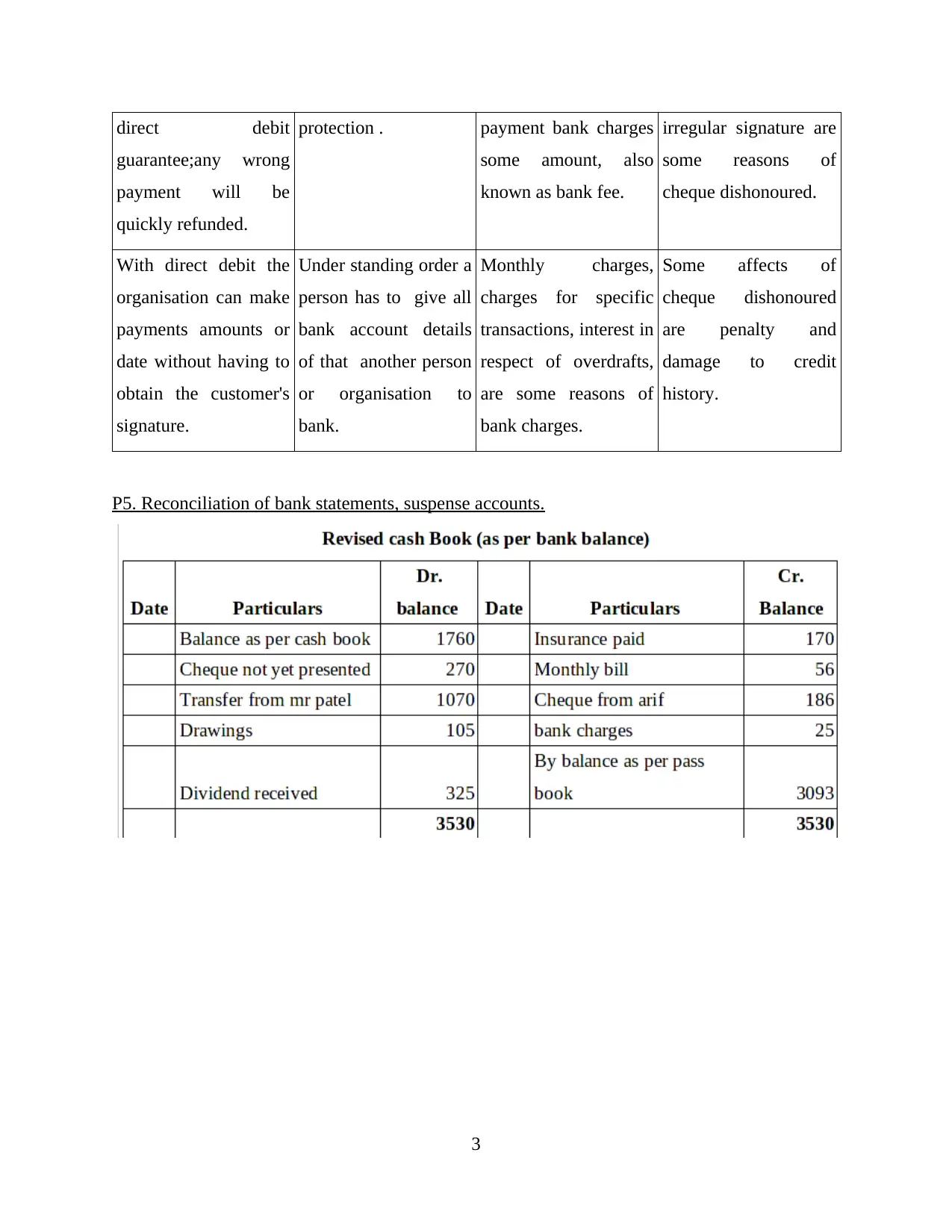
direct debit
guarantee;any wrong
payment will be
quickly refunded.
protection . payment bank charges
some amount, also
known as bank fee.
irregular signature are
some reasons of
cheque dishonoured.
With direct debit the
organisation can make
payments amounts or
date without having to
obtain the customer's
signature.
Under standing order a
person has to give all
bank account details
of that another person
or organisation to
bank.
Monthly charges,
charges for specific
transactions, interest in
respect of overdrafts,
are some reasons of
bank charges.
Some affects of
cheque dishonoured
are penalty and
damage to credit
history.
P5. Reconciliation of bank statements, suspense accounts.
3
guarantee;any wrong
payment will be
quickly refunded.
protection . payment bank charges
some amount, also
known as bank fee.
irregular signature are
some reasons of
cheque dishonoured.
With direct debit the
organisation can make
payments amounts or
date without having to
obtain the customer's
signature.
Under standing order a
person has to give all
bank account details
of that another person
or organisation to
bank.
Monthly charges,
charges for specific
transactions, interest in
respect of overdrafts,
are some reasons of
bank charges.
Some affects of
cheque dishonoured
are penalty and
damage to credit
history.
P5. Reconciliation of bank statements, suspense accounts.
3
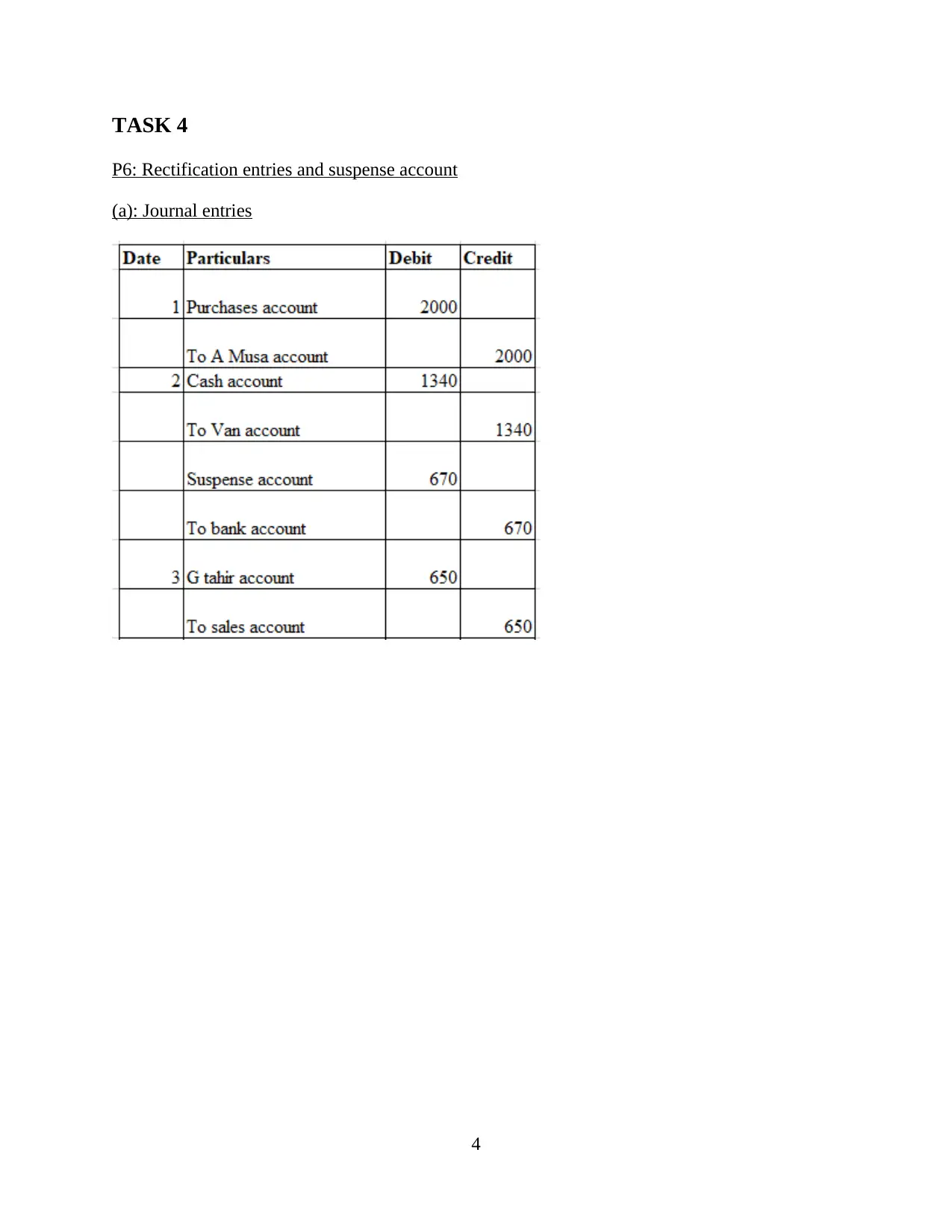
TASK 4
P6: Rectification entries and suspense account
(a): Journal entries
4
P6: Rectification entries and suspense account
(a): Journal entries
4
Paraphrase This Document
Need a fresh take? Get an instant paraphrase of this document with our AI Paraphraser
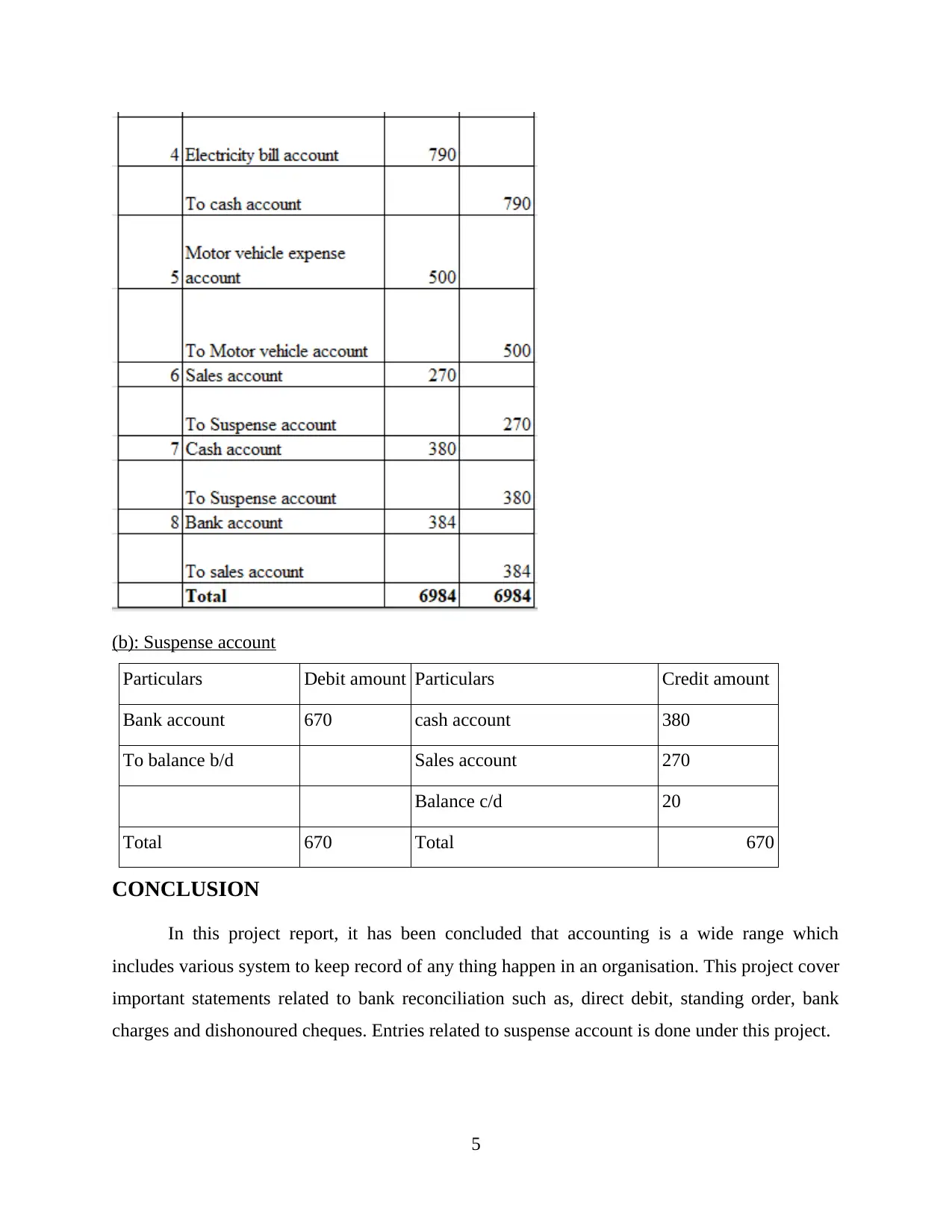
(b): Suspense account
Particulars Debit amount Particulars Credit amount
Bank account 670 cash account 380
To balance b/d Sales account 270
Balance c/d 20
Total 670 Total 670
CONCLUSION
In this project report, it has been concluded that accounting is a wide range which
includes various system to keep record of any thing happen in an organisation. This project cover
important statements related to bank reconciliation such as, direct debit, standing order, bank
charges and dishonoured cheques. Entries related to suspense account is done under this project.
5
Particulars Debit amount Particulars Credit amount
Bank account 670 cash account 380
To balance b/d Sales account 270
Balance c/d 20
Total 670 Total 670
CONCLUSION
In this project report, it has been concluded that accounting is a wide range which
includes various system to keep record of any thing happen in an organisation. This project cover
important statements related to bank reconciliation such as, direct debit, standing order, bank
charges and dishonoured cheques. Entries related to suspense account is done under this project.
5
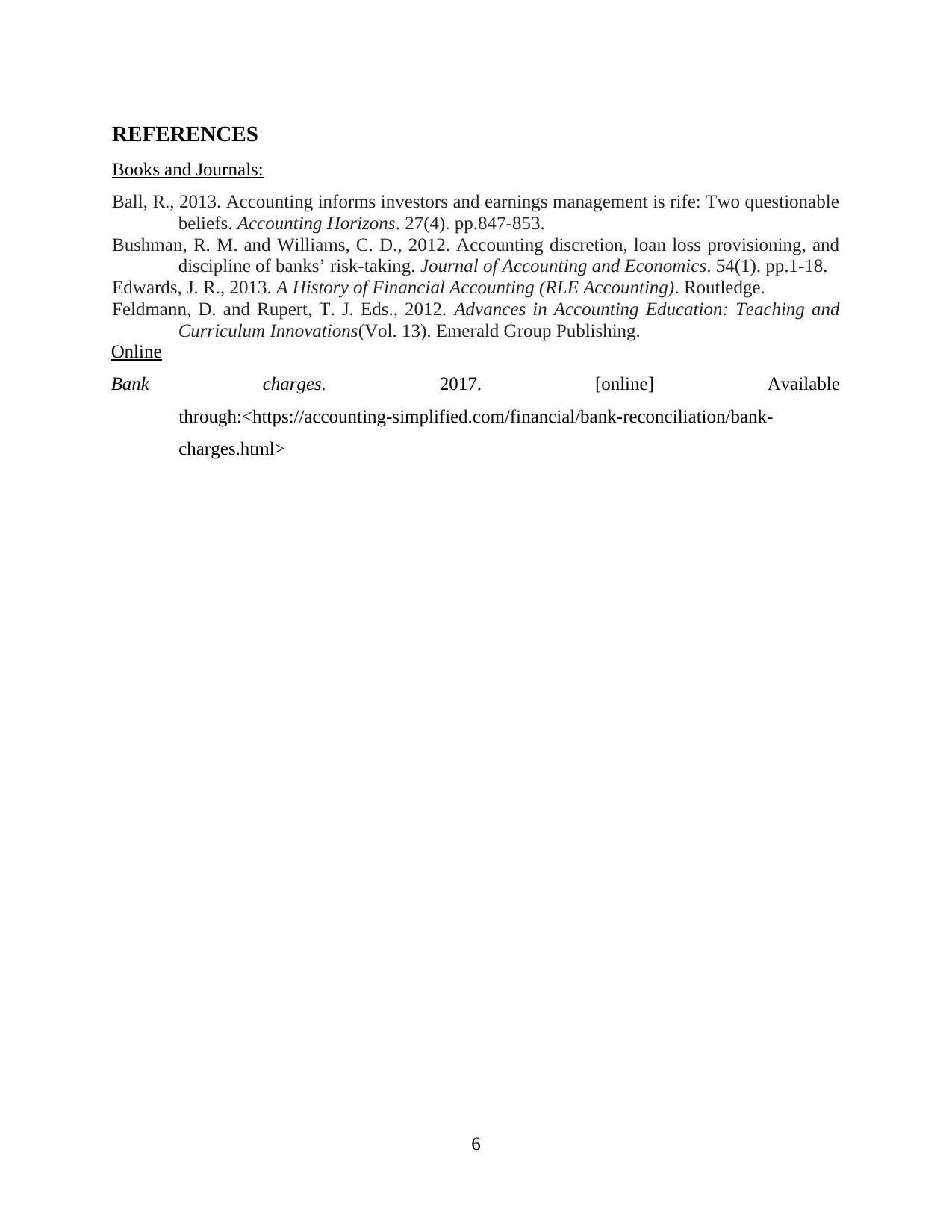
REFERENCES
Books and Journals:
Ball, R., 2013. Accounting informs investors and earnings management is rife: Two questionable
beliefs. Accounting Horizons. 27(4). pp.847-853.
Bushman, R. M. and Williams, C. D., 2012. Accounting discretion, loan loss provisioning, and
discipline of banks’ risk-taking. Journal of Accounting and Economics. 54(1). pp.1-18.
Edwards, J. R., 2013. A History of Financial Accounting (RLE Accounting). Routledge.
Feldmann, D. and Rupert, T. J. Eds., 2012. Advances in Accounting Education: Teaching and
Curriculum Innovations(Vol. 13). Emerald Group Publishing.
Online
Bank charges. 2017. [online] Available
through:<https://accounting-simplified.com/financial/bank-reconciliation/bank-
charges.html>
6
Books and Journals:
Ball, R., 2013. Accounting informs investors and earnings management is rife: Two questionable
beliefs. Accounting Horizons. 27(4). pp.847-853.
Bushman, R. M. and Williams, C. D., 2012. Accounting discretion, loan loss provisioning, and
discipline of banks’ risk-taking. Journal of Accounting and Economics. 54(1). pp.1-18.
Edwards, J. R., 2013. A History of Financial Accounting (RLE Accounting). Routledge.
Feldmann, D. and Rupert, T. J. Eds., 2012. Advances in Accounting Education: Teaching and
Curriculum Innovations(Vol. 13). Emerald Group Publishing.
Online
Bank charges. 2017. [online] Available
through:<https://accounting-simplified.com/financial/bank-reconciliation/bank-
charges.html>
6
1 out of 9
Related Documents
Your All-in-One AI-Powered Toolkit for Academic Success.
+13062052269
info@desklib.com
Available 24*7 on WhatsApp / Email
![[object Object]](/_next/static/media/star-bottom.7253800d.svg)
Unlock your academic potential
© 2024 | Zucol Services PVT LTD | All rights reserved.





